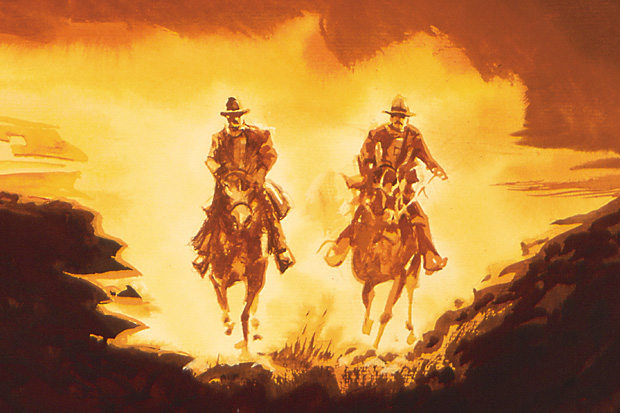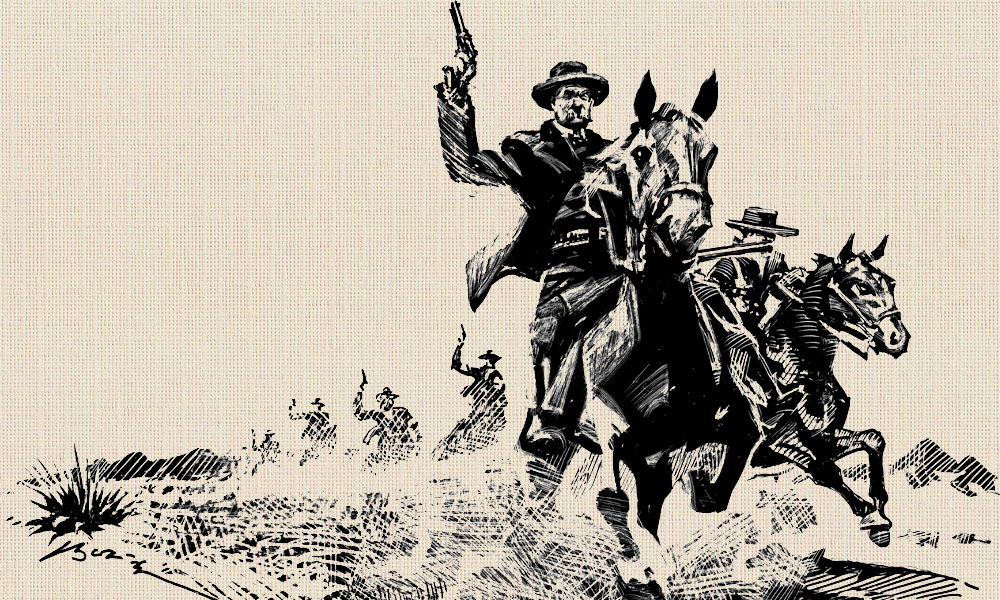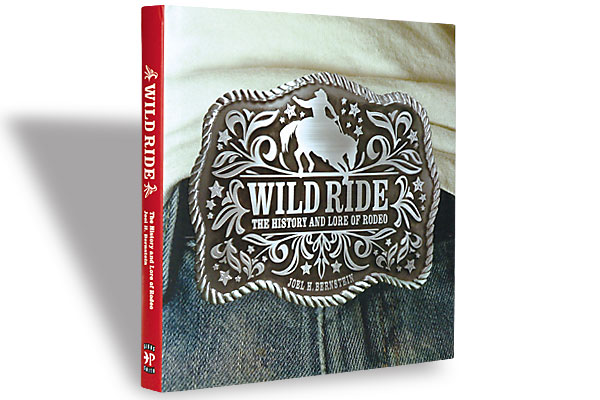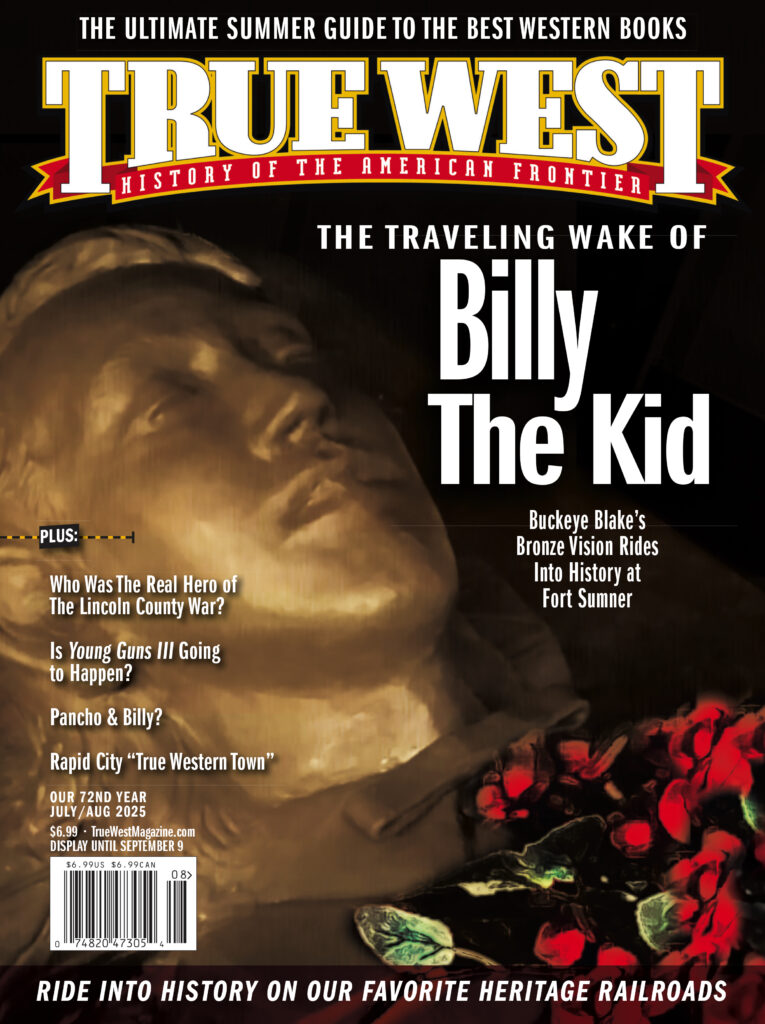 Early on the morning of November 3, 1908, Aramayo Francke & Company manager Carlos Peró left Tupiza with his teenage son, Mariano, and a servant to deliver the mining company’s payroll to its administrative head-quarters in Quechisla, a three-day journey. That evening, they stayed at an Aramayo hacienda in Salo. At dawn they resumed their trek, Peró on foot and his companions on mules.
Early on the morning of November 3, 1908, Aramayo Francke & Company manager Carlos Peró left Tupiza with his teenage son, Mariano, and a servant to deliver the mining company’s payroll to its administrative head-quarters in Quechisla, a three-day journey. That evening, they stayed at an Aramayo hacienda in Salo. At dawn they resumed their trek, Peró on foot and his companions on mules.
About 9:30 that morning, the trio rounded a curve on the far side of Huaca Huañusca (Dead Cow Hill, see map) and encountered two bandits brandishing new Mauser carbines. The shorter outlaw, Butch Cassidy, stepped forward and told the riders to dismount and hand over the payroll. Peró said they could take anything they wanted.
While the Sundance Kid covered them, Butch searched their bags. Finding nothing, he said in English, “We are not interested in your money or personal belongings. We want the 80,000 bolivianos you are carrying for the Aramayo Company.”
Peró replied they had only 15,000 bolivianos (worth about $6,000 in 1908). The larger payroll, he explained, had been scheduled for the following week. The outlaws were not happy with the news. Butch continued searching and soon spotted the packet of bills wrapped in homespun cloth, which he passed to Sundance. He then grabbed the bridle of one of the Aramayo mules (perhaps considering it as partial compensation for the lighter-than-expected payroll), and the bandits retreated into a ravine.
After the pair had departed, Peró’s party continued north toward the village of Guadalupe. At noon, they encountered a muleteer named Andrés Gutiérrez. Peró scribbled a note in pencil and gave it to Gutiérrez to deliver to the Aramayo hacienda in Salo. Once the note reached Salo, another messenger rushed it to Aramayo headquarters in Tupiza, from where an alarm went out over telegraph wires to the surrounding com-munities, as well as to Argentine and Chilean officials along the borders. Military patrols and armed miners (whose pay had been stolen) were soon combing the ravines, watching the roads, guarding the train stations and looking for strangers in villages throughout Southern Bolivia.
Peró spent the night in the mining camp at Cotani, a day’s journey shy of Quechisla. In a letter detailing the morning’s events to his superiors, he surmised that the brigands had “undoubtedly planned their retreat carefully; otherwise they would not have left us with our animals, or they would have killed us in order to avoid leaving witnesses or to gain time.”
“The two Yankees wore new, dark-red thin-wale corduroy suits with narrow, soft-brimmed hats,” the observant Peró continued, “the brims turned down in such a way that, with the bandannas tied behind their ears, only their eyes could be seen. One of the bandits, the one who came closest to and talked with me, is thin and of normal stature, and the other, who always maintained a certain distance, is heavyset and taller. Both of them carried new carbines, which appeared to be of the Mauser-type . . . but they were completely new. . . . The bandits also carried Colt revolvers, and I believe they also had very small Browning revolvers outside their cartridge belts, which were filled with rifle ammunition.”
While Peró was writing his report, Butch and Sundance made their way south, through rough, uninhabited terrain. They skirted Tupiza under cover of darkness and after midnight reached Tomahuaico, the camp of a British engineer, A.G. Francis, who was supervising the transportation of a gold dredge on the Río San Juan del Oro. (Calling themselves James “Santiago” Lowe and Frank Smith, Butch and Sundance had met Francis earlier in the year and won him over with their legendary charm.) According to Francis, Butch was sick and went to bed at once, but Sundance stayed up late, talking about the holdup and their current situation. The outlaw spoke of having “made several attempts to settle down to a law-abiding life, but [said that] these attempts had always been frustrated by emissaries of the police and detective agencies getting on his track, and thus forcing him to return to the road.” Nevertheless, he claimed, “he had never hurt or killed a man except in self-defense, and had never stolen from the poor, but only from rich corporations well able to support his requisitions.”
Although Francis disapproved of his visitors’ misdeeds, he had found them “very pleasant and amusing companions” and did not intend to betray them to the authorities.
The next morning, a friend arrived in Tomahuaico, reporting that a military patrol from Tupiza was headed in their direction. The outlaws hastened to leave and, to Francis’ horror, they insisted he accompany them. Expecting them to flee south to Argentina, he was surprised when they informed him they were going to “Uyuni and the north.” Their destination may have been Oruro, which had 5,000 foreign residents, and would have made it easy for them to blend in. The Hotel Americano in Oruro was Sundance’s last known mailing address.
Fearing that he’d be caught in a crossfire if the soldiers overtook them, Francis nervously led the bandits south and west along the Río San Juan del Oro, then north through a narrow, twisting ravine to the village of Estarca. Francis arranged for them to spend the night in a room at the home of Narcisa de Burgos.
Early the next morning, Butch and Sundance thanked Francis for his help and let him go, with instructions to tell any soldiers he encountered that he had seen them making for the Argentine border.
At Cucho, 10 miles north of Estarca, the bandits asked for directions to San Vicente, a mining village at 14,500 feet in the Cordillera Occidental. Sundance was riding a black mule and Butch the brown Aramayo mule with the company brand (“Q” for Quechisla). Leaving Cucho, they followed the long, ascending trail into the Andes. At dusk, the bandits crested the bowl of a dun-colored mountain and saw below them in the fading light a cluster of adobe buildings, San Vicente. Though they didn’t know it, they had reached the end of the trail.





